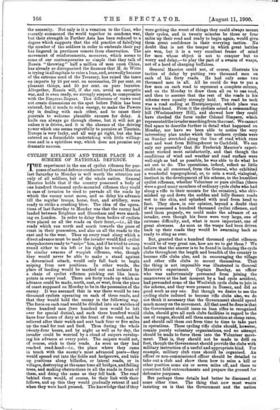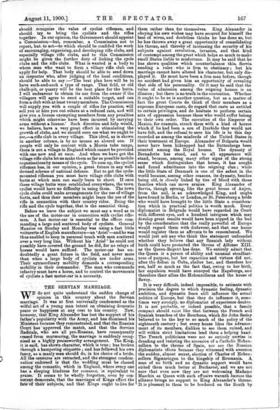CYCLIST RIFLEMEN AND THEIR PLACE IN A SCHEME OF NATIONAL
DEFENCE.
THE experiment in the use of cyclist riflemen for pur- poses of national defence conducted by General Maurice last Saturday to Monday is well worth the attention not only of all soldiers, but of the whole nation. General Maurice holds that if the country possessed a body of one hundred thousand cycle-mounted riflemen they could in case of invasion be used to pervade all the roads by which the enemy must move, and so delay his advance till the regular troops, horse, foot, and artillery, were ready to strike a crushing blow. The idea of the opera- tions of last Saturday to Monday was that the enemy had landed between Brighton and Shoreham and were march- ing on London. In order to delay them bodies of cyclists were placed on all the roads on their front,—i.e., all the roads which run north and south towards the piece of coast in their possession, and also on all the roads to the east and to the west. Thus up every road along which a direct advance must be made the invader would find cyclist sharpshooters ready to "snipe" him, and if he tried to sweep round either to his left or his right he would be met by similar swarms of waspish riflemen, who, though they would never be able to make a stand against a determined attack, would only fall back to begin sniping from new positions. In other words, the place of landing would be marked out and isolated by a chain of cyclist riflemen pricking out like lance- points in every road. There are forty roads up which an advance could be made, north, east, or west, from the piece of coast supposed on Monday to be in the possession of the enemy. It was assumed that in war there would be two thousand cyclists operating on each of these roads, and that they would hold the enemy in the following way. The force on each road would be divided into six watches of three hundred men (two hundred men would be left over for special duties), and each three hundred would have four hours of duty at the front of the road, and be relieved after their watch and sent back four or five miles up the road for rest and food. Thus during the whole twenty-four hours, and by night as well as by day, the invader could be worried by a cloud of snipers envelop- ing his advance at every point. The snipers would not, of course, stick to their roads. As soon as they had reached road-head—i.e., the place where they came in touch with the enemy's most advanced posts—they would spread out into the fields and hedgerows, and take up positions along hillsides, or lateral roads, or in villages, destroying at the same time all bridges, and felling trees, and making obstructions in all the roads in front of them, and doing the same as they fell back. The road behind them would, of course, be their link with their fellows, and up this they would gradually retreat if and when they were hard pressed. The knowledge that if they were getting the worst of things they could always mount their cycles, and in twenty minutes be three or four miles up their road and ready to begin again, would give them great confidence in their worrying tactics. No doubt that is not the temper in which great battles are won, but it is a very excellent frame of mind for men whose object is not to conquer but to worry and delay,—to play the part of a, swarm of wasps, not of a herd of charging buffaloes.
General Maurice could not, of course, illustrate his tactics of delay by putting two thousand men on each of his forty roads. He had only some two thousand men in all. All he could do was to put a few men on each road to represent a complete column, and on the Monday to draw them all on to one road, and then to assume that the rest of the roads in his scheme were equally strongly held. The road he took was a road ending at Hurstpierpoint, which place was his road-head. From it the cyclists seized a commanding hill (Woolstonbury Hill), and showed how they could have checked the force under Colonel Simpson, which representedthe invadermarchingfrom thecoast. We cannot find space to describe further in detail what happened on Monday, nor have we been able to notice the very interesting plan under which the northern cyclists were on Sunday stretched along the line of road which runs east and west from Billingshurst to Cuckfield. We can only say generally that Sir Frederick Maurice's experi- ment worked most satisfactorily, and that though the conditions of wind and weather and road surface were well-nigh as bad as possible, he was able to do what he set out to do. The operations, indeed, reflect no little credit on all concerned, from the General, who exhibited a wonderful topographical, or, to coin a word, vialogical, instinct in the development of his scheme, to the humblest cyclist rifleman, whether Volunteer or pure civilian (there were a good many members of ordinary cycle clubs who had slung a rifle to their mounts for the occasion), who skir- mished up and down the sodden and hilly Sussex roads wet to the skin, and splashed with mud from head to foot. They show, in our opinion, beyond a doubt that if we possessed a hundred thousand cyclist riflemen, and used them properly, we could make the advance of an invader, even though his force were very large, one of extreme difficulty, and, what is more important, one of great slowness. As soon as the wasps had been driven back up their roads they would be swarming back as ready to sting as ever.
But, granted that a hundred thousand cyclist riflemen would be of very great use, how are we to get them ? We believe that the answer is to be found in inducing the cycle clubs throughout the length and breadth of the country to become rifle clubs also, and in encouraging the village and other rifle clubs to mount themselves. That the thing is not impossible was illustrated in General Maurice's experiment. Captain Barclay, an officer who was unfortunately prevented from joining the manceuvres at the last moment by a bad cycle accident, had persuaded some of the Woolwich cycle clubs to join in the scheme, and they were present in Sussex, and did as good work as any one. But though we desire to see the cycling clubs induced to become rifle clubs also, we do not think it necessary that the Government should spend much money on the movement. All that need be done is that the Government should issue on loan rifles to recognised clubs, should give all such clubs facilities in regard to the use of ranges, should sell them ammunition at cheap rates, and should call them out from time to time to take part in operations. These cycling rifle clubs should, however, remain purely voluntary organisations, and no attempt should be made to force them into the Volunteer move- ment. That is, they should not be made to drill on foot, though the Government should provide the clubs with military instruction of a useful and appropriate kind. For example, military club runs should be organised. An officer or non-commissioned officer should be detailed to take out a club and show them how to seize a, hill or other position some six or seven miles off, and there to construct field entrenchments and prepare the ground for defensive purposes.
But perhaps these details had better be discussed at some other time. The thing that now most wants insisting on is that the Government and the nation should recognise the value of cyclist riflemen, and should try to bring the cyclists and the rifles together. In our opinion, the Government should appoint a Commission—but, remember, a Commission not to report, but to act—to which should be confided the work of encouraging, organising, and developing rifle clubs, and especially village- rifle clubs, and to this Commission might be given the further duty of linking the cycle clubs and the rifle clubs. What is wanted, is a body to whom men who want to form a village rifle club can apply, for help. That body should be able to send down an inspector who, after judging of the local conditions, should be able to say :=The best plan here will be to have such-and-such a type of range. That field, or old chalk-pit, or quarry will be the best place for the butts. I will endeavour to obtain its use from the owner if the villagers will agree to erect a suitable target, and can form &club with at least twenty members. The Commission will supply you with a couple of rifles for practice, will sell you or hire you out others at a reduced rate, and will give you a license exempting members from any penalties which might otherwise have been incurred by carrying arms without a license.' Such direction and help would, we believe, have a very great effect in stimulating the growth of clubs, and we should soon see what we ought to see,—a rifle club in every village. This ideal, as is shown in another column, is by no means an absurd one. If people will only be content with a Morris tube range, there is not a village in England which cannot be provided with one now and at once. And when we have got the village rifle clubs let us make them as far as possible mobile organisations by means of the cycle. To sum up, the cyclist rifleman has, in our opinion, a great future in any well- devised scheme of national defence. But to get the cycle. mounted rifleman you must have village rifle clubs with butts at which men can easily learn to shoot. If once these village butts were established everywhere, the town cyclist would have no difficulty in using them. The town cycle clubs could make arrangements for the use of village butts, and thus their members might learn the use of the rifle in connection with their country rides. Bring the rifle and the cycle together, that is the essential thing.
Before we leave the subject we must say a word as to the use of the motor-car in connection. with cyclist rifle- men. A fast motor-car is essential to the officer com- manding a large and scattered body of cyclists. General Maurice on Sunday and Monday was using a fast little voiturette of English manufacture—an 'Arier—and. he was thus enabled to keep in personal touch with men scattered over a very long line. Without his Ariel ' he could not possibly have covered the ground he did, for no relays of horses would have sufficed. The motor-car has un- doubtedly a great future in the field, and never more than when a large body of cyclists are under arms. Their extraordinary mobility demands a corresponding mobility in their commander. The man who commands infantry must have a horse, and to control the movements of cyclists a fast motor-car i8 a necessity.



































 Previous page
Previous page